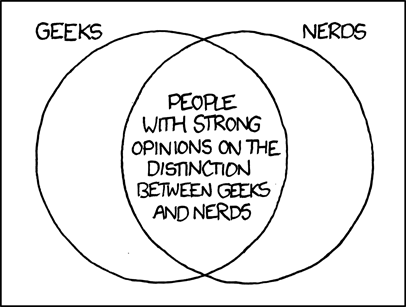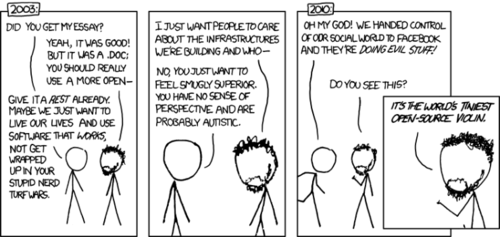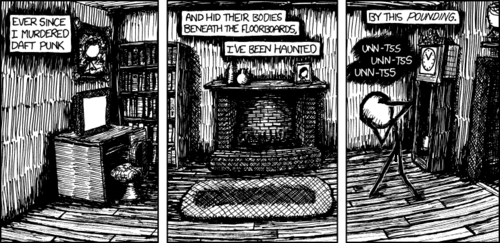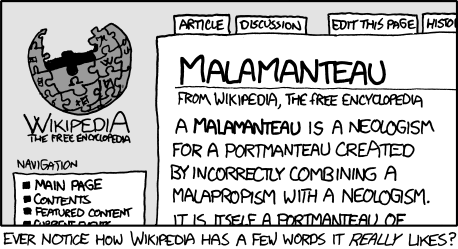
In today’s Work the Author uses a mainstay of his genre, the Venn Diagram, to make an observation about his self-identified cultural subgroups. One group, “geeks” (defined as carnival performers who perform disgusting acts such as eating rotten food) is compared to another group, “nerds” (defined as those who are singly minded people devoted a given field of study, even to extremes). The author notes that the only people who really care about the difference between these groups are people who are in the intersection of these two groups.
This comic makes the humorous observation that while many geeks do not like being called obsessed and many nerds refuse to eat rotten food, only a member of both subsets would ever actually use both these words in the same sentence.

A woman is having a baby. It is a mean baby that has a gun. The doctor advises the woman to “pull”, because then the baby will shoot her uterus instead of the doctor. The doctor is doing this not because he is afraid of babies, but because he is afraid of guns.
As we have seen in previous issues, the Author has a somewhat adversarial opinion of women’s role in reproduction. This opinion is fairly representative of the young male psyche, which craves female attention (e.g., sex, submission, etc.) but fears any sort of sincere human connection or compromise. The child and its “stickup” represents the Author’s fear of obligation and compromise; he cannot maintain his self-deception of being a good and well-adjusted person without raising a child and being faithful to a woman. But, this places the Author in a position of nearly intolerable compromise and obligation. His possessions, free time, and energy must all be devoted to his new child. This effectively robs him of his youth.
While many men experience some passing feelings of resentment to women who bear their young, to someone like the Author that confrontation would be too direct. He may hate the woman for robbing him of the rest of his life, but he fears confronting her because she may revoke his sole sexual outlet. Instead, the child becomes a thief who’s very existence will steal time that could have been spent having sex and then blogging about it, making Lego Mindstorms, programming a new Python SMTP library, or posting on Hacker News. The loss of these familiar activities represents an unbearable degree of change in a life that has been locked in an almost perfect stasis since college.

A common joke used by both dyslexics and those who mock them is “lysdexic untie”, which is how someone suffering from that condition may spell “dyslexics unite.”
The joke that the Author is making is that a group of dyslexics, wishing to make a self-deprecating tshirt, may actually reverse the reversed phrase. This would produce the correct spelling in the end, thus defeating the purpose of the tshirt.
May 24, 2010 at 12:18am
Notes

A refreshing mixture of sex and geek culture, this comic tells the fictional tale of a boy who, in preparation for having his first sex, decides to watch a tutorial video on the internet. However, in a hilarious turn of events, the boy accidentally watches a humorously-nonsensical “speed run” sex tutorial (a tutorial on how to complete a video game in the shortest amount of time possible). This undoubtedly led to the boy ejaculating inside of the girl’s vagina as fast as he could (well before her orgasm), which is widely considered embarrassing and undesirable.

Today’s comic is attempting to make a political statement about the superiority of using open source software and technology. It uses a narrative involving two stick figures to make a comparison between the turn-of-the-century debates over an open document format, and the current debates and concern over the closed nature of Facebook.
The disheveled, open-source loving stick figure is shown in 2003 suggesting to a colleague that he use an open document format, rather than the proprietary format of Microsoft Word. The “strait-man” quickly interrupts him with one of the counter-arguments to an open format - a suggestion that any debates over format are for “nerds” and ultimately hurt the everyday user’s productivity. As a retort, the Richard Stallman fan begins an argument about good infrastructure, hoping to explain its importance for the future, only to be cut off with claims that he is autistic (a reasonable claim, as he isn’t making eye-contact at the time).
Fast-forward to modern-day, and the strait-man is now (literally) running to the open-source loving “nerd,” in a panic over the recent “news” that Facebook may be using the data that their users give to them to generate profits. The bearded man then makes a joke that combines a cliché (world’s smallest violin) with geek culture.
The hidden joke in this punchline is that the strait-man actually has no reason to panic, as the hysteria over Facebook’s “evil” behavior was caused by the bearded man himself! The bearded man was able to fool the strait-man by regularly placing irrational fears about Facebook in his head over the course of the last three years. Fears such as: “if you click that button, it will tell people you did so!” and “when you put information about yourself online, it is possible for people and companies to see that information - but that is only bad in the case of Facebook.”
This comic strip was made to elicit desk-shakingly violent nods of approval from the audience, who will primarily agree with this anti-corporate sentiment. It is meant to give a small self-esteem boost to those who, due to reading Chomsky and dystopian cyberpunk novels, automatically support open alternatives to any service, project or piece of software - alternatives that inevitably fail to gain any traction due to their poor design, lack of direction or needless complexity.

Today, like so many other days, part of a well-known cliché has been substituted with a piece of geek culture.
The cliché in this case is the “killer calling from inside the house”, based off of the 1979 film When a Stranger Calls. Except instead of the killer’s phone calls being traced to inside the house, it is his IP address that is traced to the 192.168/16 block - the block generally reserved for the local (e.g. household) network.

It appears that the Author, in an attempt to increase traffic to his blog and web comic, was fooled into attending a conference on Social Media and was disappointed in its offerings. These conferences are organized and run by self-proclaimed “Social Media Experts”, which generally translates to “I either have an english degree or none at all, have no technical skills, cannot create anything of value - but I still need a job.”
These “experts” generally talk people (like the Author) into listening to them with big promises of traffic and money. They then spout-out useless mantras that don’t actually mean anything and couldn’t possible help anyone achieve their selfish goals of attaining internet celebrity. Instead, they merely attempt to create more of themselves - useless people making useless websites that steal or link to content created by others that add nothing but useless page views.

This comic strip is a reference to the widely known short story by Edgar Allan Poe, “The Tell-Tale Heart.” In this short, a man murders another man and hides his body under the floor of his home. Eventually, the murderer’s guilt causes him to hallucinate the beating heart of his victim emanating from the floorboards.
In the comic strip, however, the man has murdered popular electronic music duo Daft Punk, whose highly repetitive and measured beats could be likened to that of a heart. This similarity in timing and sound is what made this comic strip happen.

The Author, a well-known fan of Wikipedia, has squeezed yet another joke from its bountiful bosom. This particular joke uses the clever linguistic trick of “word-play” as well as “meta-humor” to derive a new word: malamanteau. Malamanteau is a combination of the words “malapropism” (the substitution of a word for a word with a similar sound) and “portmanteau” (the combination of two words).
The creation of this new word or “neologism” is particularly humorous as the methods used to create it are the very words used in the process. This is called a meta or “self-referential” joke.
Note: Finding humor in word-play is an excellent way to feel superior to other people, without needing to think creatively or experience actual emotions.

The popular children’s game Operation attempts to simulate the steady hand necessary to perform surgery by asking the players to remove simulated organs from a cartoon character without touching the metal sides of the cavity (thereby closing an electrical circuit and setting off a buzzer).
But wouldn’t it be crazy and humorous if a child swallowed that same buzzer mechanism, thereby giving an actual physician the experience of the game during a real surgery? According to the Author, it would.
8.










